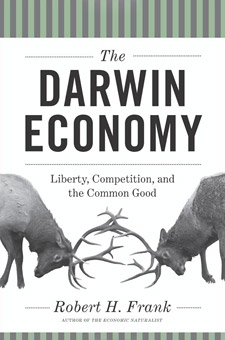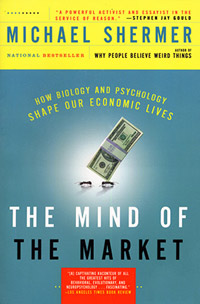On Thursday June 4, I attended the Cato Institute half-day conference in Century City, California, which started out with a lecture by U.C. Santa Barbara evolutionary psychologist Leda Cosmides, one of the founders of that science along with her husband John Tooby. Cosmides’ talk was on the evolution of cooperation, but for this audience she tailored her lecture toward politics and economics (Cato is a libertarian think tank in D.C.), by asking “Why do free societies arise so rarely and with such difficulty?”
Unfortunately, Leda tried to squeeze about two hours of material and powerpoint slides into a 35-minute talk, and so she was necessarily brief as she blasted through slide after slide, each up on the screen for only seconds, making note taking impossible. That’s too bad because there was a lot of data slides that I think the audience would have liked to absorb (I know I would have). Nevertheless, Leda’s central point was this: our brains evolved for solving specific problems in the EEA (the Environment of Evolutionary Adaptation — the Paleolithic), and so we have domain specific programs that help organize our experiences. The problem is that the modern world is so different from the EEA that it causes conflicts. For example, most hunter-gatherer societies are egalitarian because they live in relatively resource-poor environments and are often unsure about their safety and nourishment, and so we evolved many cognitive instincts for cooperation, food sharing, and group cohesiveness, because everyone in the group was either related to you or you know very well, so as the political saying goes, we must hang together so that we don’t hang separately. But the modern world is nothing like this.
I’ve written about this problem in my book The Mind of the Market, which focuses on evolutionary economics, whereby the world in which we evolved of small bands of egalitarian hunter-gatherers is radically different from today’s world that is resource rich and with vast disparities of wealth between the richest and the poorest. Thus, we have a natural tendency to resent wealthy people, distrust free markets, and misunderstand the bottom-up process of modern economies and try to control them from the top down, usually with disastrous consequences (e.g., Alan Greenspan and the Fed’s constant manipulation of interest rates sent false signals into the market for the price of money, leading to artificially large bubbles that then burst).
Leda noted the difference between hunting and gathering in terms of risk and uncertainty: Hunting meat is highly variable, success is as much due to luck as it is skill, and 4/10 times the hunter comes home empty-handed. Thus, hunter-gatherers must pool risk to deal with frequent reversals of fortune through food sharing. By contrast, gathering foods is a low risk process that depends on effort, not luck, and the results are mostly shared only within the family and trusted partners, but not to the group at large. Cosmides explained that this evolved psychology can be seen today in which we make distinctions between people in need of our help because they were unlucky (as with the hunters who return empty-handed) versus the gatherers who don’t bring home the vegetables because they were lazy and were loafing on the job. We are inclined psychologically to want to help the former but not the latter.
The political and economic consequences of this evolved psychology can be seen today in debates about healthcare, welfare, social security, etc., which are all attempts to pool risk among everyone in society, but without any distinction between those who suffer because of bad luck versus those who suffer because of laziness or lack of ambition. Modern political states are in the business of redistributing wealth from those who have it to those who do not, and since there is no attempt to discriminate between those who were unlucky from those who were just lazy, the people who earn that money through hard work and talent who then have it confiscated by the government and given to people they do not even know, naturally feel resentful, even though statistically the wealthy are extremely generous in giving to private charities that they voluntarily choose.
Cosmides also noted the psychological difference between working land that you own versus working land that the government owns: the agricultural policy of the USSR allowed 3% of land on collective farms to be private, and it turned out that between 45% and 75% of all food in the USSR was the product of that 3% of private farms.
So, in conclusion, Cosmides noted that there is a mismatch between the ancestral and modern worlds, our minds evolved to navigate family and friends and small groups, certain laws and institutions satisfy the moral intuitions these programs generate whereas other laws and institutions regularly fail in the modern world. Cosmides concluded: “Liberty provides the solution to most social problems, but few appreciate it because of our evolved minds.”
The second talk of the day was by Dan Mitchell, the Cato Institute expert on tax reform, supply-side tax policy, the flat tax, and tax competition. His talk was titled: “America’s Looming Fiscal Meltdown.” We are shifting to a European size welfare state, he noted, dolling out blame to both Democrats and Republicans, starting with George W. Bush, who Mitchell noted in his eight year term increased the Federal budget from $1.8 trillion to $3.5 trillion budget, and then noted Obama says he wants change to even more government, adding another trillion dollars to the budget in his first term, if not more. Mitchell also busted the myth that Bush increased the budget for natural security after 9/11. Not true, he said: most of it was for pork projects for his political cronies.
Mitchell then noted that Keynesianism is bad theory: borrow money and then give it to people so they will spend it — but moving money from the right pocket into the left pocket does not produce more wealth; it’s just redistribution. It does not increase wealth. Only free markets can do that. And in any case, where does the government get the money to redistribute? From us! But they take their cut as the middleman, and therein lies the problem. Bigger government did not work for Hoover or Roosevelt, and all that federal spending to get us out of the depression did not work: we did not get back to 1929 GDP levels until WWII. Neither did federal stimulus plans work for Presidents Ford or Bush I during their recessions, and Keynesianism failed utterly in Japan during the 1990s, when its national debt went from 60% of GDP to 150% of GDP. I.e., Keynesianism does not work, and yet politicians on both the right and the left insist that the only reason it doesn’t work is because: “government isn’t spending enough.” Wrong!
We are on the road to serfdom, says Mitchell, as our federal spending is projected to jump from 22% of GDP today to 45%–55% of GDP in the coming years (mostly because of Social Security, Medicare, and Medicaid). Unless our GDP doubles along with federal spending (it won’t) the collapse is coming. Well, not a collapse, per sey: America will not become Argentina or Zimbabwe. But we will become France: instead of growing 2.5–3% a year, we’ll grow 1–1.5%, a difference that has enormous long-run implications, lowering per capita GDP 30–40% below what it otherwise would be. More spending means more taxes: more income taxes, payroll taxes, death taxes, double taxation of dividends and capital gains. And this doesn’t work. In 1980 Ronald Reagan cut the top tax rate from 72% to 28%, and between 1980 and 1988 the number of rich people (millionaires) rose from 116,800 to 723,700, and their share of paying for the federal government rose from $19 billion in income taxes to $99.7 billion in income taxes. In other words, lowering taxes on the rich generates more revenue for the federal government, which is counterintuitive.
In the end, however, there are moral consequences to such economic decisions. Mitchell: “Today there are over 2 million people in America who completely depend on welfare: prisoners; well, the welfare state is a prison for the human soul.”



